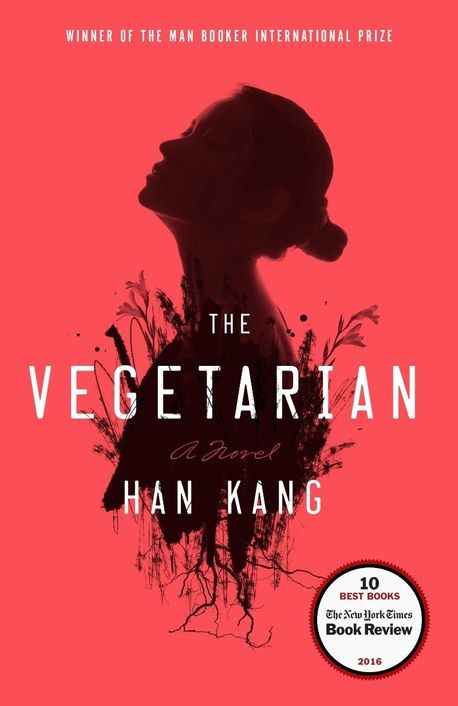
 |
| English editions of Han Kang's "The Vegetarian" (Kyobo) |
Amid nationwide elation over South Korean novelist Han Kang being awarded the 2024 Nobel Prize for Literature, one of her works has stirred debate for being "deemed harmful to youths."
The controversy ignited after Han's "The Vegetarian" was found to be among the 2,528 books removed from some 2,490 elementary, middle and high school libraries in Gyeonggi Province last year for being detrimental to students.
Among them were not only Han Kang's book, but also "Blindness" by another Nobel Prize-winning author, Jose Saramago; Michael Roizen's "You: The Owner's Manual," which won the Science Book of the Year award in Germany; and Susan Meredith's "What's Happening to Me?" which won the Times Educational Supplement's senior information book of the year award. The last two books are about human bodies and sex education for teenagers.
The move comes after the Gyeonggi Provincial Office of Education sent a memo to schools at the suggestion of a conservative NGO advising schools to dispose of sex-related books. However, of the removed books, only one was reportedly designated harmful to young people by the Publication Industry Promotion Agency of Korea under the Ministry of Culture, Sports and Tourism.
Han's historic Nobel Prize in Literature win stirred mixed reactions on school grounds and homes as well.
"My daughter who is in 8th grade said she wanted to read Han's 'The Vegetarian.' However, her teachers recommended she read her different book, 'Human Acts,'" said Lee, a mother of two daughters adding that "The Vegetarian" was said to be inappropriate for her age.
At an online cafe for moms, one post read "Han Kang's 'Vegetarian' is on the to-buy list in my kid's school library. How can our children read such a book containing a lascivious description of intercourse?" The writer added that they would make a formal complaint to the school.
However, some say it is "absurd" to stop children from reading a book that is recognized worldwide.
"We should be proud to have a South Korean author win this year's Nobel Prize in Literature, becoming the first South Korean to be honored with one of the world's most prestigious literary awards," a teacher at a high school in Seoul told The Korea Herald.
"It is absurd to just ban students from a fruitful experience of the joy of reading a great book. Before saying malicious things about Han's book, people should know the overall context of the book," she added.
Han became the 121st laureate of the prestigious award and the 18th woman to receive the prize. She is also the first Asian female winner.
Han was recognized “for her intense poetic prose that confronts historical traumas and exposes the fragility of human life,” according to Mats Malm, permanent secretary of the Swedish Academy.
The committee said "In her oeuvre, Han confronts historical traumas and invisible sets of rules and, in each of her works, exposes the fragility of human life. She has a unique awareness of the connection between body and soul, the living and the dead, and in her poetic and experimental style has become an innovator in contemporary prose."
Han’s first novel to be translated into English, "The Vegetarian," portrays the consequences that unfold when protagonist Yeong-hye stops eating meat. Her decision is rejected by her husband and father. At the same time, her brother-in-law fantasizes about her increasingly and, after asking her to model for him, becomes obsessed with her through his exploration of Yeong-Hye’s body. Ultimately, she is committed to a psychiatric clinic. Her sister tries to help her, but Yeong-hye continues to sink into a psychosis-like condition.
“In a style both lyrical and lacerating, it reveals the impact of this great refusal both on the heroine herself and on those around her. This compact, exquisite and disturbing book will linger long in the minds, and maybe the dreams, of its readers,” Boyd Tonkin, the chairman of the Booker judging panel, said when the book won the International Booker Prize in 2016.
While "The Vegetarian" has never been officially labeled as a harmful book for young people, whether it is harmful or not is a matter of perspective, experts said.
Five sex experts interviewed by local broadcaster SBS all voiced their disagreement with the ban. They said that the value of a work's message should be considered rather than the sensationalism of certain passages and that with proper reading guidance from teachers and parents, it can help develop healthy sexual values, the broadcaster reported.
According to UNESCO's International Guide to Sex Education, young people aged 15 and over should be able to distinguish between healthy sexual relationships and resist unwanted sexual pressures, and "The Vegetarian" can provide an opportunity for such reflection and discussion. The point is that it is more important to have an environment where sexual expression can be critically understood rather than simply censored, experts noted.
Meanwhile, the Gyeonggi Education Office's suggestion on which books should be banned is expected to be one of the debated agendas in the National Assembly's education committee's national audit of local education departments, scheduled for Tuesday. Several lawmakers on the committee have reportedly asked for data on the status of the disposal of sex education books by local education authorities.
Books that are deemed harmful to teenagers are subject to a number of restrictions, including plastic packaging, stickers and display classification.
To prevent them from being sold or rented to young people, "harmful publications" are subject to a number of restrictions, including plastic packaging, stickers and display in public places to prevent them from being sold or rented to youths.









